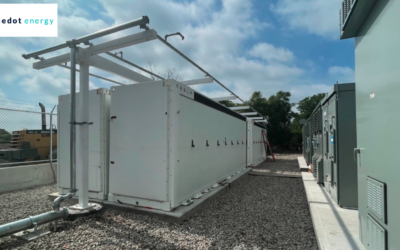
Northvolt has now raised over US$3 billion to support its plans to become a major player in the European battery manufacturing space, including US$1.6 billion in debt financing which it announced today.
An initial 60GWh of annual output is planned across two lithium-ion battery cell factories, one in Sweden (40GWh) and another in Germany (20GWh). Northvolt has said that it is targeting the manufacture of the world’s most sustainable batteries, partly through powering factories with low cost renewable energy but also by securing 50% of its raw materials from recycled batteries. It also wants to take a 25% share of the European market by 2030. The Swedish site, Northvolt Ett, is already under construction, with production expected to begin next year, while Northvolt Zwei, in Germany, will begin operations in 2024, built as a joint venture with automaker Volkswagen.
Northvolt sent Energy-Storage.news a press release today announcing that a consortium involving commercial banks, pension funds and public financial institutions has signed with the startup for a US$1.6 billion debt raise. The more than US$3 billion it has raised to date will be used for R&D as well as for factory development. A recent report from Mercom Capital found that Northvolt’s raise of US$1.5 billion in early 2019 accounted for a large portion of total corporate funding into the energy storage sector in the first half of the year.
“The fact that we have these world-class financial institutions supporting a new industry in Europe is a clear sign of where the markets are headed and the opportunity that brings for sustainable projects,” Northvolt CFO Alexander Hartman said.
Try Premium for just $1
- Full premium access for the first month at only $1
- Converts to an annual rate after 30 days unless cancelled
- Cancel anytime during the trial period
Premium Benefits
- Expert industry analysis and interviews
- Digital access to PV Tech Power journal
- Exclusive event discounts
Or get the full Premium subscription right away
Or continue reading this article for free
“This new industrial landscape will need significant investments over the coming years.”
The company will also manufacture complete systems, having started producing its first commercial system units last year at a further, smaller factory in Poland. While it has tie-ups with significant players in the automotive industry Volkswagen and BMW and the majority of its cells and systems will target that sector, Northvolt president for battery systems Emad Zand told Energy-Storage.news a while ago that around a quarter of its planned capacity could be used to serve the stationary storage segment.
More than two-thirds fewer CO2 emissions in footprint, company claims
On sustainability, in that interview earlier this year, Emad Zand had said that “a lot of the CO2 footprint is in the battery itself” when it comes to energy storage and its use on the grid.
“If you choose a Northvolt battery system you’re saving approximately 69kg of CO2 per kilowatt-hour of battery that you deploy. That’s like a 71% decrease in the CO2 footprint of the solution that is being deployed on site,” Zand said, calling it a “huge differentiator” against competition.
While he said that utilities at the forefront of decarbonisation of the grid should also look at CO2 footprint of batteries when conducting requests for proposals, Northvolt believes its batteries and systems will be economically competitive.
“We do not bank on the fact that we should be able to command a premium due to our green profile. We are set up to be able to compete on a competitive basis, when it comes to our pricing, given that we have a vertically integrated setup in a low energy cost country like Sweden.
“We will be able to serve our customers with competitively priced solutions. On top of that we can then deliver the green story. I hope the utilities that are end-customer facing, and many of them that have policymakers, government as the ultimate owners as they do in many European countries, legislation will be a portion that drives a differentiation for us versus our competitors.”
Europe’s manufacturing poised for huge growth
The European battery manufacturing sector is poised for enormous growth, as is the global industry. Recent findings and forecasts from BloombergNEF highlighted that in 2008, there was just 6GWh of lithium battery manufacturing worldwide, 97% of it in China. By 2019, around 365GWh existed globally, although Europe took just a 5% split of that and China retained 75%. By 2023, BloombergNEF analysts believe Europe’s share of a global 1,230GWh worldwide will be up to about 10%.
The European Commission has formed a European Battery Alliance of stakeholders across the continent in a big to accelerate and support manufacturing efforts, and the Commission committed €3.2 billion (US$3.5 billion) last December to create a “pan-European” battery ecosystem among EU member states, while the European Investment Bank (EIB) said in May this year that it expected to increase funding in battery-related projects to over €1 billion (US$1.1 billion) during 2020 alone.
The EIB was among the latest to offer financing to Northvolt, with Export-Import Bank of Korea, Nordic Investment Bank, along with pension funds, banks and others including BNP Paribas, SMBC, Société Générale, Dankse Bank and Germany’s nationally-owned investment bank KfW.





